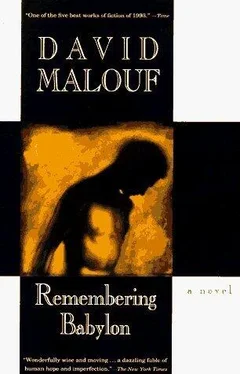THE SCHOOLMASTER, George Abbot, let it be thought in the settlement that he was a man of twenty-six or seven with the manners of an older man even than that. He was, in fact, just nineteen, but his plainness, and the severity with which he dealt with every sort of youthful enthusiasm, made possible the deception. He affected a pipe, did not roll his sleeves up, even on days when the heat under the shingles of his one-roomed schoolhouse was at furnace pitch, and when he was invited out on Sundays, did not allow the mothers of his pupils to indulge him with second helpings. He did not wish to be seen as a boy; all the more because he was afflicted with the appetites of one, in a body which, to his consternation, was still growing and which at every point let him down.
In the mean little room they had provided him, behind the blackboard in the room where he extended authority over a rabble of seven to twelve-year-olds, he fought with his loneliness, his youth, and a sensual nature that had been subdued at home by the rigours of convention and the softening presence of his sisters, but also by the duty he felt to his own high prospects. Out here, in the listless air and salt damp of a place where everything was at a point of bursting fullness, he was constantly tormented. All that had once been fine in him had gone to rot, and he had too high a regard for the truth, was too arduous in the exercise of a strict self-scrutiny, not to ask what sort of fineness it might be that was at the mercy of mere conditions and had so easily succumbed.
He knew the falseness of his position and hated it. When he was invited out, he was, often enough, the only one at the table wearing shoes.
The older girls of the household, when they fixed their frank gaze upon him, would make him colour so fiercely that to hide it he had to take the handkerchief from his sleeve and go through the motions of blowing his nose — a performance they regarded as so remarkable that the whole table stopped and stared.
Their brothers, fellows of his own age, sat smirking. They did not know how to address him without doing violence to their own rather shaky dignity. He was Mr Abbot to their parents, and to their little brothers and sisters he was Sir. When he ran into them lounging about the settlement, roughly at ease, as he was not, with their youth, they would fall silent till he passed, then whisper and guffaw, though never loud enough for complaint.
His pupils, thin-cheeked the girls, the boys, some of them almost men, shag-haired and puffy lidded, had been up before dawn to milk cows or do whatever other chores their rough farm life demanded. They swayed at their desks. Their eyelids flickered.
The singing of the nine times table did not enliven them, nor did Shelley’s ‘To a Skylark’ when their young voices sent it out on the torpid air. Defeated by the dullness that glanced back at him from slate-pencil holders gone dark with sweat and the dead blue of their teeth, he felt a slow rage take hold of him.
With an irony of which he was perfectly aware, he chalked up the words from the Reader that they were to learn for homework: mettlesome, benign, decorum, prudence … In the morning, after the monitor had sponged them off, he would hear them over and punish those who got them wrong, the boys and girls equally, one stroke of the ruler for each word misspelled.
A kind of loathing for them, and for himself as well, came with the vinegary odour as they held out their hands, stretched back the fingers and showed the calluses, ragged where they had been picking at them, and the fate-lines grained with dirt.
He hated these petty tyrannies. They mocked with littleness every aspiration he felt towards what was noble and generous in him. But he beat them, and the immediate physical effect was releasing. Then, when he saw the fierce little will with which even the smallest of them clamped their hands in their armpits and fought back tears, he could have burst into tears himself at the shame of it.
He had never meant to come to Australia, least of all to this outlandish part of it.
The only boy in a family of five, he had been educated at the expense of his godfather, a bachelor of luxurious taste and eccentric views who was a distant relation of his mother’s, and had once perhaps, or so she liked to suggest, been an admirer. She had no hesitation, when George’s father died, in applying to him on the boy’s behalf.
Mr Robertson, ‘Cousin Alisdair’, came to take a look at them, and though, to her disappointment, the great man did not repeat the visit, he did agree to pay for George’s schooling, and twice a year, at Easter and Michaelmas, the boy went to stay with him at his country place near Perth. He had presents of pencils and books, and at Christmas little packets of sugar plums and walnuts and sweet-tasting tangerines, which he smuggled home to his sisters; and on his birthday each year was taken to be measured for his suits. The tailor’s assistant showed him materials, and advised by Cousin Alisdair he learned to distinguish between the different qualities of tweed, then stood on a box while Mr Davidson, marvelling at how fast he grew, what a sturdy chest he had, applied the tape, and Cousin Alisdair, in a high-backed chair, turned the pages of a magazine.
He was a clever little fellow, with all the pert charm that goes naturally with childish self-assurance, and was soon a favourite with all the servants of the household and its many visitors, who were impressed with the ease with which, in his strapped trousers and tucked shirt, he entered a drawing room, his readiness to answer posers from Cousin Alisdair’s legal friends, or to run messages or fetch, with such little-mannish gallantry, a book or a plaid for the ladies, and his ingenuity in devising, out of a stick and the paper from a sweet packet, a swat against the sleepy wasps that came stumbling from the orchard to disturb their rest. He took all this as no more than the tribute due to a charm that was native and irresistible in him, so it was a shock when, at fifteen or so, life dealt him a first and fatal disappointment. The beginnings of a terrible plainness began to declare itself and he saw — it took him a little time to quite grasp it — that people no longer extended the same interest to him, and when he fell back on his old tricks of charm, looked embarrassed: they were no longer appropriate to the big, overgrown fellow he had become.
Cousin Alisdair too lost interest in him. He had offended, he saw, with a good deal of bitterness, against the great man’s high regard for the aesthetic. He had to fight hard not to be hurt into a permanent anger at the injustice of things, or become as morose as his heavy looks suggested.
Mr Robertson continued to pay for his upkeep and schooling, and at the beginning of each term to write to him warm, colourless letters, but they no longer met. So it was with a sense of injured pride, and the determination not to show it, that he presented himself, one morning, modestly attired and armed at last with his degree, at George Square to thank his benefactor, as was only proper, for past kindness, but also, he hoped, to receive the offer he had been promised of a place.
The footman who let him in was a well-knit, snub-nosed fellow of his own age, very fancily got up. He was inclined, George thought, to swagger, and as they passed through various rooms and the young fellow stood aside to let him pass, George felt himself the subject of lazy scrutiny, which tempted him to fiddle in a foolish way with his collar.
It was as if this big farm boy, who was, it was true, not a bad-looking fellow, had in conceit at the fine cut of his frock coat, the swelling of his calves in their pale silk stockings, together with God knows what other articles of smug self-confidence, set up a comparison between them, and settled the thing, with a good deal of satisfaction, in his own favour. George was put off his stride. He had to remind himself, firmly, that he had come here intending to make no appeal to old sentiments, and especially no attempt at old charms. Let his benefactor take him seriously, just as he was.
Читать дальше












